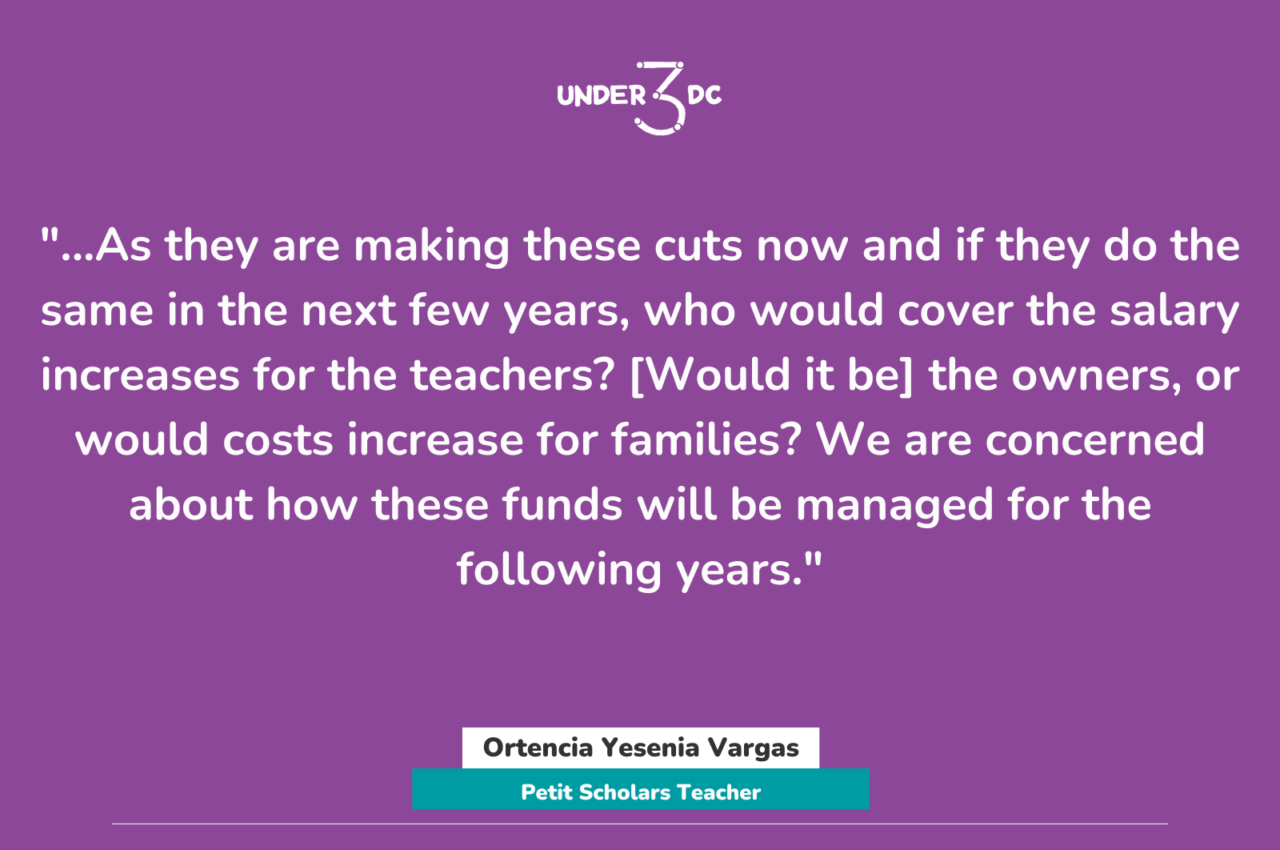ESPANOL
Buenas tardes Consejo presidente del Comité Mendelson y miembros del comité. Mi nombre es Ortencia Yesenia Vargas y soy Maestra de Petit Scholars con niños de cero a 3 años en Washington DC. Vivo en Ward 5 y miembro de Under 3 una coalición que ha asumido el compromiso de garantizar un comienzo solido para cada bebe y niño pequeño de DC. Estoy comprometida ayudarles a desarrollar las diferentes habilidades y que puedan tener éxito en la escuela. Mi testimonio de hoy se centrará en el impacto que ha tenido en mi vida el fondo de equidad salarial, y en mi opinión sobre los cambios que habrá en el funcionamiento del fondo en el futuro.
Decidí ser maestra de educación temprana por mi hijo que hoy tiene 11 años. Cuando él tenía 18 meses fue diagnosticado con Autismo. En ese tiempo el no asistía a un centro de cuidado infantil. Me recomendaron que él debería asistir a uno porque eso le ayudaría a socializar con los demás niños. A una temprana edad fue difícil encontrar un espacio, después de varios meses de estar en lista de espera al fin logre que él asistiera a un centro, esto ayudó mucho a mi hijo y fue ahí donde yo comprendí la importancia de que hubiese más programas que pudiera ayudar a más niños de la comunidad.
La decisión del Concejo de D.C. de recortar $4.4 millones del fondo de equidad salarial fue un error. Hacer recortes a este fondo antes de que el programa se haya implementado por completo me hacen preguntarme qué tan comprometido está el gobierno del Distrito con el Fondo de Equidad Salarial, en el que confío para planificar mi futuro en torno a un salario confiable.
Nuestros salarios aumentaron a través del fondo de equidad salarial para ayudarnos a cubrir gastos básicos como alimentos, alquiler y ropa, y para reconocer el arduo trabajo de cuidar a los niños del Distrito y ayudar a mantener la salud de nuestra familia. Los fondos ayudaron a educadores como a mantener a sus familias, obtener educación superior y pagar deudas médicas. Este fondo me ayudo a pagar el cuidado antes y después de la escuela de mi hijo, para así poder llegar a tiempo a mi trabajo, poder pagar mi certificación Montessori. Sin este incentivo me hubiese tocado buscar un segundo trabajo ya que nuestros sueldos como maestra de educación temprana no los alcanza para cubrir nuestros gastos.
Tengo algunas preocupaciones sobre cómo se manejó la fase inicial del fondo de equidad salarial directa a los maestros y algunas ideas sobre cómo OSSE debería manejar la implementación de la fase permanente que envía esos fondos a los empleadores que optan por participar. En un grupo de discusión de educadores reciente, algunas de las preocupaciones que escuché y quería compartir con usted incluyen los siguientes: Que va a pasar con muchos centros que no aceptarán esos fondos para las maestras? Tendrán que buscar otros trabajos donde sean mejor remuneradas. También existe preocupaciones con los dueños de centros al aceptar esos fondos porque, así como están haciendo estos recortes ahora y si hacen los mismo en los próximos años quién cubriría esos aumentos salariales a las maestras, los dueños o se tendría que aumentar el costo a la familias¡? Estamos preocupados como se va manejar estos fondos para los años siguientes.
Recibir pagos del Fondo de Equidad salarial en una suma complicó los pagos de impuestos para muchos maestros de educación temprana, incluidos mensajes confusos y contradictorios de la Oficina del Superintendente de Educación del Estado (OSSE) y Aid kit, como recibir formularios de impuestos incorrectos de Aid Kit, lo que nos obligó a los educadores a presentar declaraciones de impuestos enmendadas. Algunos educadores tuvieron que pagar hasta $300 para modificar sus formularios de impuestos debido a la confusión, otros estamos esperando que nos manden una enmienda.
Algunos educadores no recibieron pagos porque cambiaron de un centro de primera infancia a otro, otras maestras no recibieron el fondo de equidad salarial porque algunos directores no subieron correctamente las credenciales de sus educadores en el sistema de información de desarrollo profesional DELLT. Es necesario una supervisión solida de como los programas de educación temprana utilizan los fondos para garantizar que los principales beneficiarios de los complementos salariales los reciban.
Me enorgullezco de mi trabajo como educadora de la primera infancia. Espero que el Concejo de DC pueda hacer mejor para cumplir sus promesas a los educadores de la primera infancia que se beneficiarían de un Fondo de Equidad de Pago a largo plazo y exitoso. Como maestra me siente
feliz porque estoy apoyando a la educación y el desarrollo de los niños en una etapa muy importante y por eso sigo capacitando hoy quiero seguir mi bachelor en educación infantil también voy a estudiar inglés para así poder tener mejor comunicación con las familias que no hablan mi idioma con ustedes expresarse directamente sin ningún traductor y poder colaborar a la comunidad.
Gracias por su tiempo,
Ortencia Yesenia Vargas
ENGLISH
Good afternoon Council Chair Mendelson. My name is Ortencia Yesenia Vargas and I am a Petit Scholars Teacher with children from zero to 3 years old in Washington DC. I live in Ward 5 and am a member of Under 3, a coalition, that is committed to ensuring a strong start for every infant and toddler in DC. I am committed to helping children develop different skills so that they can be successful in school. My testimonial today will focus on the impact the Pay Equity Fund has had on my life, and my opinion of how the fund should improve in future.
I decided to be an early education teacher for my son who is now 11 years old. When he was 18 months old he was diagnosed with Autism. At that time he did not attend a child care center. It was recommended to me that he should attend one because it would help him socialize with other children. At an early age it was difficult to find a space, after several months of being on the waiting list I finally got him to attend a center. This helped my son a lot and it was there that I understood the importance of having more programs than could help more children in the community.
Our salaries were increased through the Pay Equity Fund to help us cover basic expenses like food, rent, and clothing, and to recognize the hard work caring for District children and helping keep our family healthy. The funds helped educators like them support their families, obtain higher education and pay off medical bills. This fund helped me pay for my son’s before and after school care so I can get to work on time, and to pay for my Montessori certification. Without this incentive I would have had to look for a second job since our salaries as early educators are not enough to cover our expenses.
The decision of the D.C. to cut $4.4 million from the pay equity fund was a mistake. Making cuts to this fund before the program is fully implemented makes me wonder how committed the District government is to the Pay Equity Fund, which I want to trust to plan my future around a reliable salary.
I have some concerns about how the initial phase of the direct Pay Equity Fund to teachers was handled and some ideas about how OSSE should handle the implementation of the permanent phase that sends those funds to employers who choose to participate. At a recent educator focus group, some of the concerns I heard and wanted to share with you include the following: What is going to happen to many centers that won’t accept these funds for teachers? They will have to look for other jobs where they are better paid. There are also concerns with the owners of centers when accepting these funds because, just as they are making these cuts now and if they do the same in the next few years, who would cover those salary increases for the teachers, the owners, or would the cost have to be increased to the families? We are concerned about how these funds will be managed for the following years.
Receiving payments from the Pay Equity Fund in one lump sum complicated tax payments for many early education teachers, including confusing and conflicting messages from the Office of the State Superintendent of Education (OSSE) and Aid kit, such as receiving incorrect tax forms from Aid Kit, forcing us educators to file amended tax returns. Some educators had to pay up to $300 to amend their tax forms due to the confusion, others are waiting for an amendment to be sent to us.
Some educators did not receive payments because they moved from one early childhood center to another, other teachers did not receive the pay equity fund because some directors did not correctly upload their educators’ credentials into the DELLT professional development information system. Strong oversight of how early education programs use funds is necessary to ensure that the primary recipients of the Pay Equity Funds receive them.
I take pride in my work as an early childhood educator. I hope the DC Council can do better to deliver on its promises to early childhood educators who would benefit from a long-term and successful Pay Equity Fund. As a teacher I feel happy because I am supporting the education and development of children at a very important stage and that is why I continue training today. I want to continue my bachelor’s degree in early childhood education. I am also going to study English so that I can have better communication with families that do not speak my language with you express yourself directly without any translator and be able to collaborate with the community.
Thanks for your time,
Ortencia Yesenia Vargas


